Same old.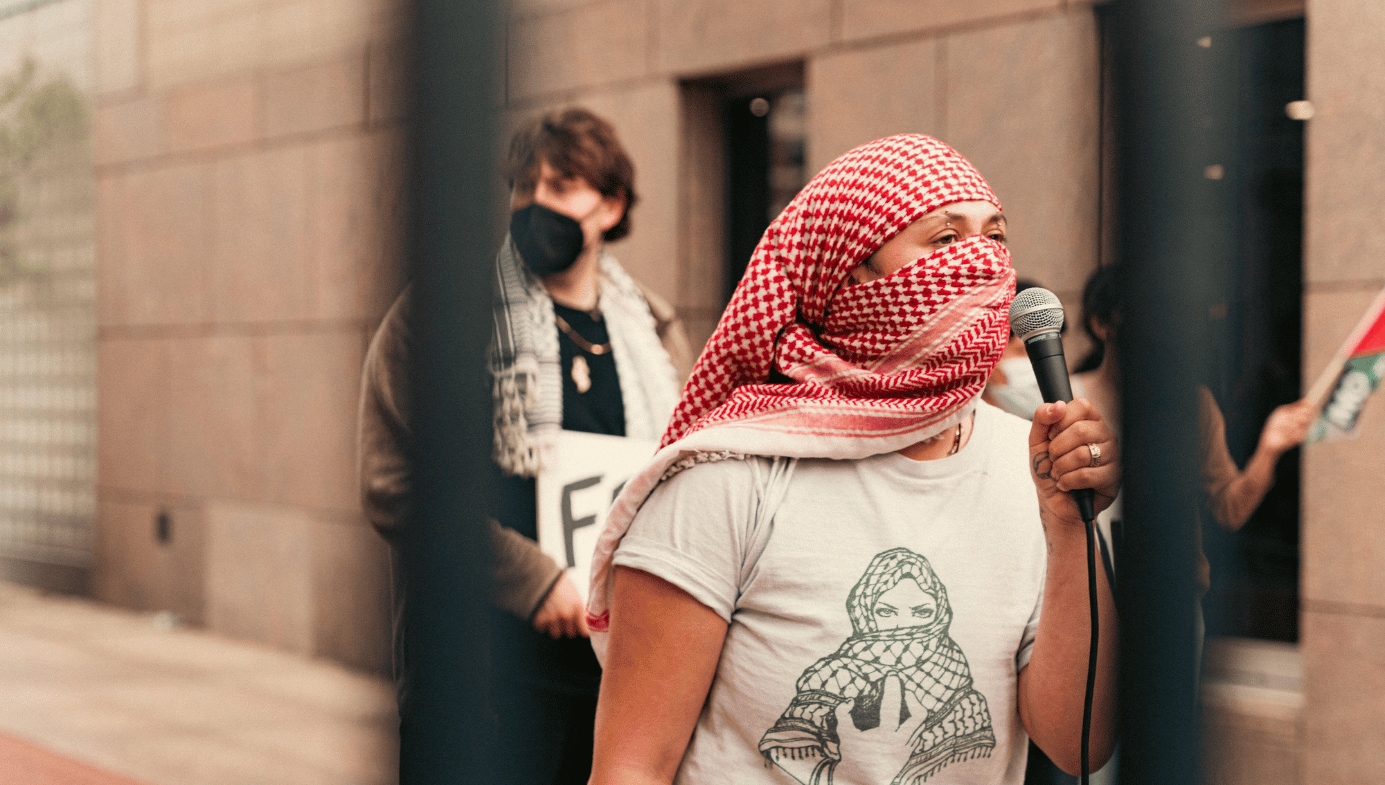
Pro Hamas in the west - and their adventures
- Thread starter mandrill
- Start date
Imagine for a moment that neo marxists and Islamic terrorist supporters would manage to overthrow the regime in USA.
how long it would take them to forget forever ideas like “humanity”, “empathy” and “oppressed”? Like a millisecond?
Full on Islamphobe.
Full on Islamphobe.
Jewish Anti-Zionists Fight Slander Against Their Pro-Palestinian Advocacy
Those who claim pro-Palestinian Jews are not really Jewish are “by my definition, completely unhinged.”
NewsPolitics
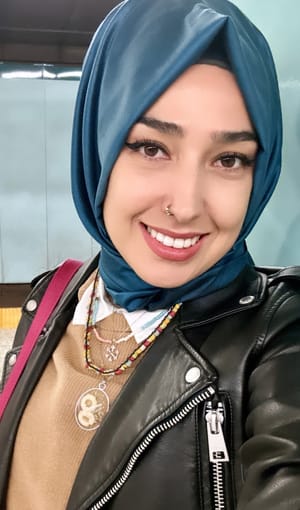
by Nur Dogan
April 30, 2024 ∙ 6 min read
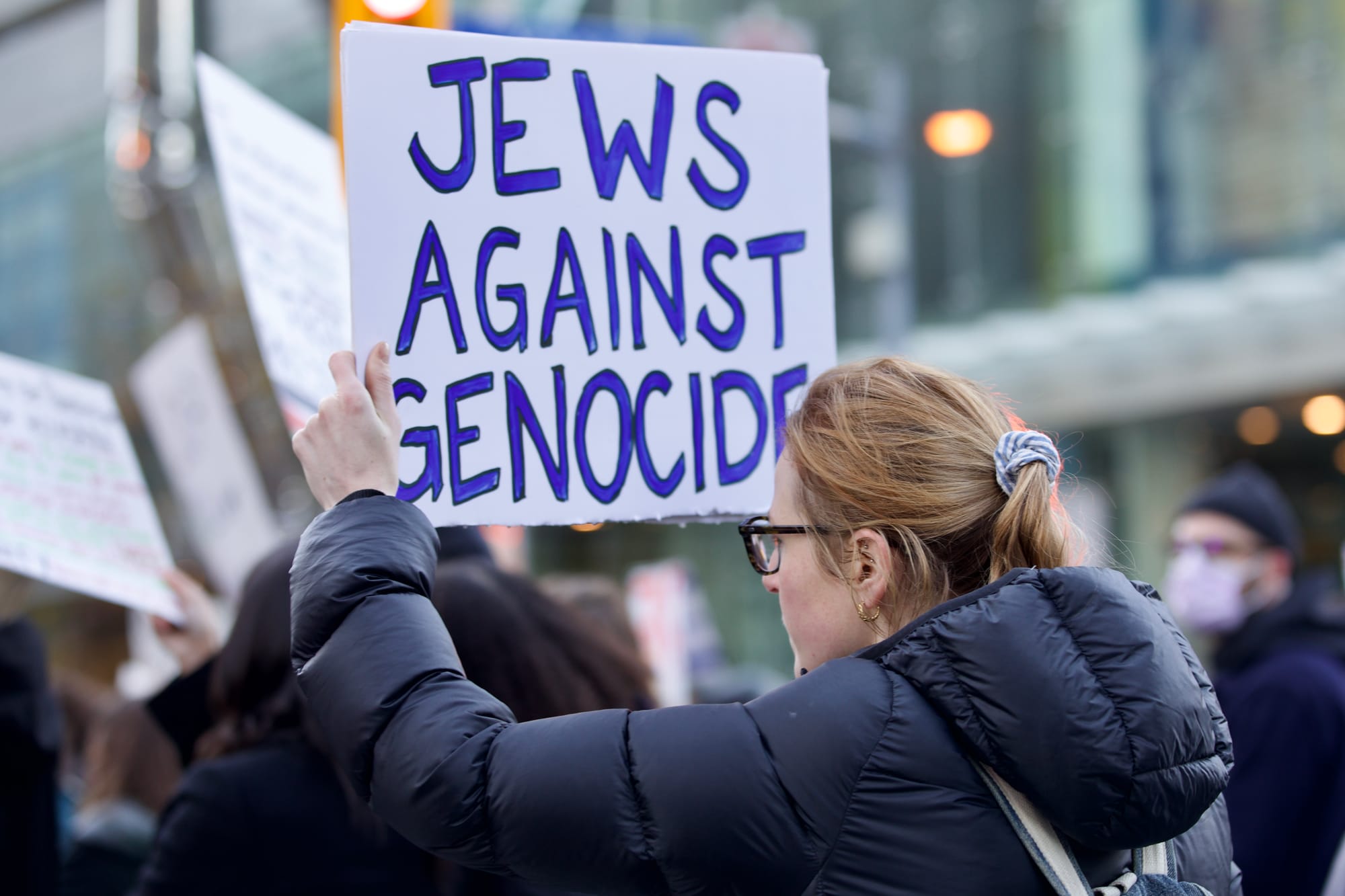
Photo credit: Nur Dogan.
Jewish activists across the world have attended pro-Palestinian protests for the past six months to stand against Israel’s war on Gaza, which is being examined at the International Court of Justice (ICJ) as a “plausible” case of genocide.
Many of those Jewish activists face claims from some of Israel’s supporters that they are not really Jewish, or that they are “self-hating.” Activists say these insults erase a long history of Jewish solidarity in fighting against oppression and opposing Zionism.
David Mivasair, a retired rabbi living in Hamilton who served two different synagogues for about 23 years in Vancouver, told The Maple he has frequently received such allegations on social media and in the Jewish community because of his stand against genocide in Gaza.
“Zionist organizations and people try everything they can to discredit me,” Rabbi Mivasair explained. Some Hamiltonians wrote letters to the editor of a local newspaper claiming he is an antisemite.
“I became a rabbi, and I spent my entire life promoting Judaism,” he said.
Rabbi Mivasair is not invited to any meetings or events held at Jewish schools, seniors’ homes, family service centres, or summer camps run by pro-Israel organizations because of his position on Israel. He said that he is a “persona non grata” among such groups.
Zionism, a movement which began in Europe in the late 19th century, is a form of Jewish nationalism and is the political ideology that drove the establishment of the state of Israel.
Theodor Herzl, known as the founder of Zionism, established the Zionist Congress in 1897. For decades, a majority of Jewish people around the world opposed the Zionist movement on religious or political grounds, and Herzl’s project only became the majority view among Jewish people in the 1920s and 1930s — although it still faced significant Jewish opposition.
The Zionist project achieved its goal of establishing the state of Israel in 1948 by ethnically cleansing about 750,000 Palestinians from their homeland and forcing them to become refugees. Palestinians refer to this event as the Nakba, which means “catastrophe” in Arabic.
“Every single act perpetrated by the Israeli government and military against the Palestinian people — since 1948 to present — goes against the core tenets, ethics, laws, beliefs and morality of the Jewish religion,” said Gur Tsabar, a member of Independent Jewish Voices Canada (IJV) and a media spokesperson for the Jews Say No to Genocide Coalition in Toronto.
Widespread Solidarity
Thousands of Jewish pro-Palestinian protesters in Canada and the United States joined early rallies to call on their governments to support a ceasefire in Gaza and to impose an arms embargo on Israel. These activists often carried slogans refuting Israel’s insistence that its actions are done in their name.
After Hamas led an attack on southern Israel on October 7, Israel launched a massive assault on Gaza that has killed at least 34,454 Palestinians, displaced 85 per cent of the long-besieged enclave’s population, and plunged the region into a humanitarian catastrophe. At least 70 per cent of the population faces catastrophic hunger.
Many activists have been arrested for participating in protests against Israel’s actions at places ranging from Grand Central Station to university campuses. Rabbi Mivasair was arrested at a demonstration organized in the U.S. on October 18 by Jewish Voice for Peace and If Not Now.
“We were pushing Congress and the U.S. to call for a ceasefire and to stop Israel’s slaughter of Palestinians,” Rabbi Mivasair said.
When images of these demonstrations were published on social media, some users falsely claimed that the Jewish participants were not really Jewish.
Corey Balsam, the national coordinator of IJV, told The Maple that “IJV members often receive negative reactions from fellow Jews over our support for Palestinians.”
Balsam, who advocates for “the right of all people to thrive and be free from oppression,” feels a sense of responsibility to speak up because what Israel is doing, and what pro-Israel lobby organizations are defending, “is said to be in my name.”
He noted that Judaism is a religion, and Zionism is a political ideology that was developed around 130 years ago.
“[Palestinians] have been the victims of a terrible injustice of Zionists coming and taking their homes and their land and mistreating them horribly for about 80 years,” Rabbi Mivasair said. “I feel a responsibility to end that, as a Jew.”
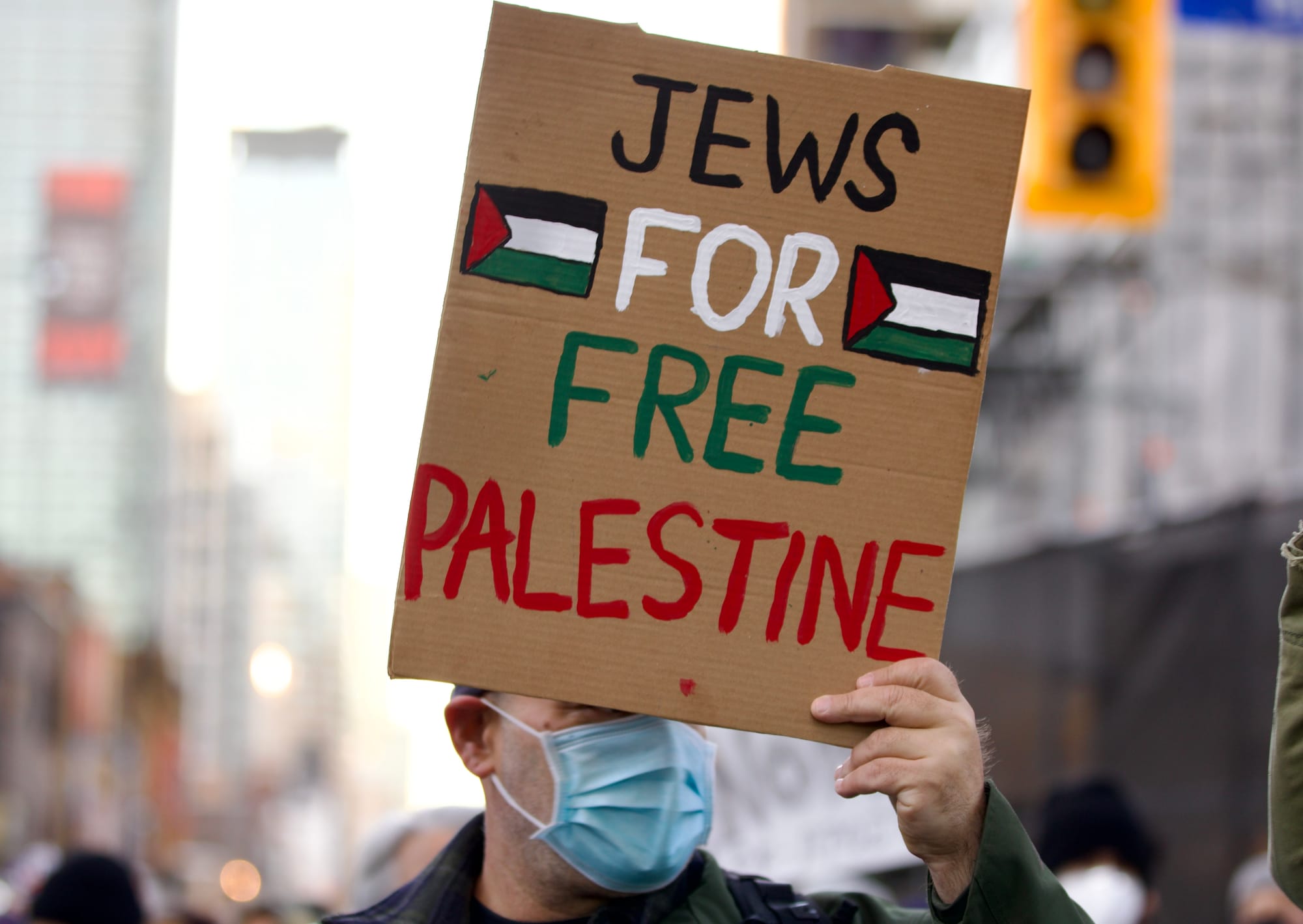
Tsabar has also been regularly attending rallies calling for an end to Israel’s brutal attack on Gaza.
He is subject to “negative comments from various Zionist trolls” on social media whenever he speaks about Israel’s actions publicly.
Those who claim that pro-Palestinian Jews are somehow not really Jewish are “by my definition, completely unhinged if they somehow have come to believe that they have been bestowed with some magical power to decide who is and is not a Jew,” said Tsabar.
Public Disputes
Jewish opposition to Zionism stands in stark contrast to pro-Israel organizations that insist anti-Zionism is a form of antisemitism. These conflicting views have been apparent in a number of public disputes in recent months.
For example, the Centre for Israel and Jewish Affairs (CIJA) issued a press release on February 9 stating that Jewish members of the Public Service Alliance of Canada (PSAC) filed 14 individual complaints against their union for, in CIJA’s words, “advancing an anti-Israel agenda and causing a culture of discrimination and harassment against Jewish PSAC members.”
The complaints followed PSAC publicly joining calls for a ceasefire in Gaza and an “end to the blockade of Gaza and for the restoration of humanitarian aid and access to the basic necessities of life.” CIJA said that its legal task force connected the complainants with an offer of pro-bono legal assistance.
On February 21, IJV published its own statement that rejected the complaint as “yet another example of the wilful and dangerous conflation of legitimate criticism of Israel with antisemitism.”
“Spurious complaints such as these undermine the struggle against antisemitism by obscuring what actual antisemitism looks like,” the statement continued.
Last month, Federation CJA, a pro-Israel Jewish community organization, obtained an injunction banning pro-Palestinian demonstrations near their property in Monteal. Protests outside the organization’s building occurred in early March when it hosted a speech by former Israeli soldiers.
The injunction also prohibited demonstrations outside a synagogue that attracted a protest when it hosted a real estate tour that, as explained by IJV, advertised “illegal Israeli settlement properties.” In a statement, IJV said that it was the events, not the fora, that prompted the protests.
“Despite the Federation’s dangerously misleading claims in their lawsuit, synagogues and Jewish community buildings are not being protested for being Jewish cultural or religious spaces,” IJV said in its statement.
Based on the injunction, IJV, Montreal4Palestine, the Palestinian Youth Movement and Alliance4Palestine will not be able to organize protests outside the venues should similar events take place inside them in the future.
IJV said that while it would respect any court order, it pledged to fight the injunction, stating that “As Jewish community members in Montreal, we clearly and loudly defend the right to protest against violence and land theft.”
Pro-Palestine protests have also been subject to claims that their chants, such as “from the river to the sea, Palestine will be free,” are antisemitic.
Calgary police charged 32-year-old Wesam Khaled for chanting the slogan last November, before the charge was stayed.
Calgarians Continue Calls For Palestinian Freedom Despite Organizer’s Arrest
“We will not accept our rights getting taken away from us.”
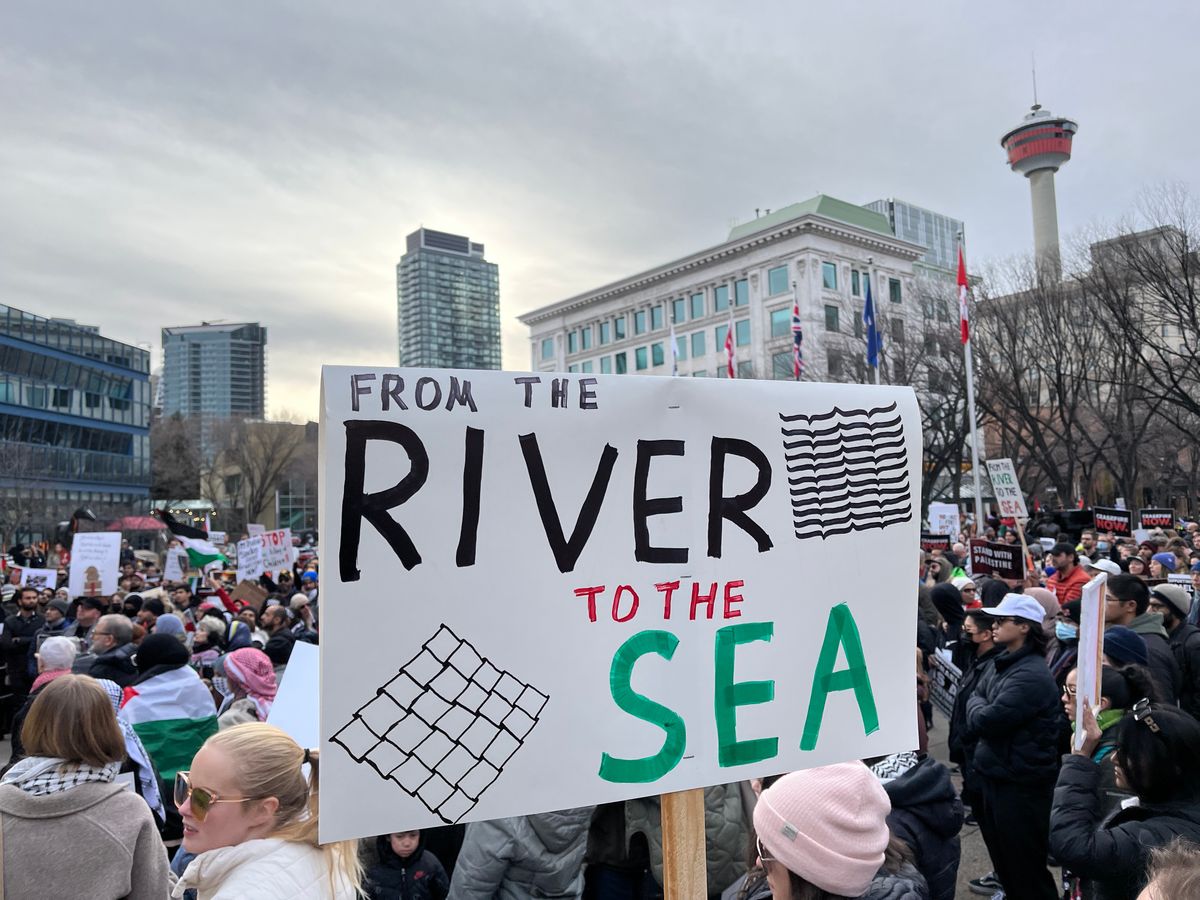
Palestinians and Jewish solidarity activists have long explained that this phrase is not antisemitic, but rather represents a call for equal democratic rights.
“It is a clear statement of the Palestinian desire for freedom and self-determination on the land they have long inhabited — between the Jordan River and the Mediterranean Sea,” Tsabar said.
Despite Palestinian solidarity activities continuing to be restricted and threatened, Balsam said IJV has received positive reactions from young Jewish people, especially in the last six months.
“This is reflected in the massive influx of new members to IJV since October 7, particularly among Jewish youth,” he said.
Nur Dogan is a Turkish-Canadian freelance journalist and photojournalist.
Share On Twitter
Share On Reddit
Full on Islamphobe.
Yes, it is genocide
In most cases of genocide, from Bosnia to Namibia, from Rwanda to Armenia, the perpetrators of the murder said they were acting in self-defence. The fact that what is happening in Gaza does not resemble the Holocaust, writes Holocaust scholar Amos Goldberg, does not mean that it is not genocide

The Palestine Project
·
Follow
10 min read
·
Apr 18, 2024
1K
28
https://medium.com/plans?dimension=...udio_button----------------------------------
By Amos Goldberg* • Translated by Sol Salbe
Yes, it is genocide. It is so difficult and painful to admit it, but despite all that, and despite all our efforts to think otherwise, after six months of brutal war we can no longer avoid this conclusion. Jewish history will henceforth be stained with the mark of Cain for the “most horrible of crimes,” which cannot be erased from its forehead. As such, this is the way it will be viewed in history’s judgment for generations to come.*Amos Goldberg is a Holocaust and genocide researcher at the Hebrew University, whose book VeZcharta — And Thou Shalt Remember: Five Critical Readings in Israeli Holocaust Remembrance will be published by Resling in the coming weeks.
From a legal point of view, there is still no telling what the International Court of Justice in The Hague will decide, although in light of its temporary rulings so far and in light of increasing prevalence of reports by jurists, international organisations, and investigative journalists, the trajectory of the prospective judgement seems quite clear.
As early as January 26, the ICJ ruled overwhelmingly (14–2) that Israel may be committing genocide in Gaza. On 28 March, following Israel’s deliberate starvation of the Gazan populace in Gaza, the court issued additional orders (this time by a vote of 15–1, with the only dissent coming from Israeli Judge Aharon Barak) calling on Israel not to deny Palestinians their rights which are protected under the Genocide Convention.
The well-argued, and well-reasoned report by UN Special Rapporteur on the Human Rights Situation in the Occupied Palestinian Territories, Francesca Albanese, reached a slightly more determined conclusion and is another layer in establishing the understanding that Israel is indeed committing genocide. Israeli academic Dr. Lee Mordechai’s detailed and periodically updated report [Heb], which collects information on the level of Israeli violence in Gaza, reached the same conclusion. Leading academics such as Jeffrey Sachs, a professor of economics at Columbia University (and a Jew with a warm attitude toward traditional Zionism), with whom heads of state all over the world regularly consult on international issues, speaks of the Israeli genocide as something taken for granted.
Excellent investigative reports such as those [Heb] of Yuval Avraham in Local Call, and especially his recent investigation of the artificial intelligence systems used by the military in selecting targets and carrying out the assassinations, further deepen this accusation. The fact that the military allowed, for example, the killing of 300 innocent people and the destruction of an entire residential quarter in order to take out one Hamas brigade commander shows that military targets are almost incidental targets for killing civilians and that every Palestinian in Gaza is a target for killing. This is the logic of genocide.
Yes. I know, they are all antisemites or self-hating Jews. Only we, Israelis, whose minds are fed by the IDF Spokesperson’s announcements and exposed only to the images sifted for us by the Israeli media, see reality as it is. As if interminable literature had not been written about the social and cultural denial mechanisms of societies committing serious war crimes. Israel is really a paradigmatic case of such societies, a case that will still be taught in every university seminar in the world dealing with the subject.
It will be several years before the court in The Hague will hand down its verdict, but we must not look at the catastrophic situation purely through legal lenses. What is happening in Gaza is genocide because the level and pace of indiscriminate killing, destruction, mass expulsions, displacement, famine, executions, the wiping out of cultural and religious institutions, the crushing of elites (including the killing of journalists), and the sweeping dehumanisation of the Palestinians — create an overall picture of genocide, of a deliberate conscious crushing of Palestinian existence in Gaza.
In the way we normally understand such concepts, Palestinian Gaza as a geographical-political-cultural-human complex no longer exists. Genocide is the deliberate annihilation of a collective or part of it — not all of its individuals. And that’s what’s happening in Gaza. The result is undoubtedly genocide. The numerous declarations of extermination by senior Israeli government officials, and the general exterminating tone of the public discourse, rightly pointed out by Haaretz columnist Carolina Landsman, indicate that this was also the intention.
Israelis mistakenly think that to be viewed as such a genocide needs to look like the Holocaust. They imagine trains, gas chambers, crematoria, killing pits, concentration and extermination camps, and the systematic persecution to death of all members of the group of victims to the last one. An occurrence like this has indeed not taken place in Gaza. In a similar way to what happened in the Holocaust, most Israelis also imagine that the victims collective is not involved in violent activity or actual conflict, and that the murderers exterminate them because of an insane senseless ideology. This is also not the case with Gaza.
The brutal Hamas attack of October 7 was a heinous terrible crime. Some 1,200 people were killed or murdered, including more than 850 Israeli (and foreign) civilians, including many children and the elderly, some 240 live Israelis were abducted to Gaza, and atrocities such as rape were committed. This is an event with Profound, catastrophic, and lasting traumatic effects for many years, certainly for the direct victims and their immediate circle, but also for Israeli society as a whole. The attack forced Israel to respond in self-defence.
However, although each case of genocide has a different character, in the scope and features of the murder, the common denominator of most of them is that they were carried through out of an authentic sense of self-defence. Legally, an event cannot be both self-defence and genocide. These two legal categories are mutually exclusive. But historically, self-defence is not incompatible with genocide, but is usually one of its main causes, if not the main one.
In Srebrenica — on which the International Criminal Tribunal for the former Yugoslavia determined on two different levels that a genocide took place in July 1995 — “only” about 8,000 Bosnian Muslim men and youths, over the age of 16, were murdered. The women and children had been expelled earlier.
The Bosnian Serb forces were responsible for the murder, their offensive took place in the midst of a bloody civil war, during which both sides committed war crimes (albeit immeasurably more by the Serbs) and which erupted following a unilateral decision by the Bosnian Croats and Muslims to break away from Yugoslavia and establish an independent Bosnian state, in which the Serbs were a minority.
Bosnian Serbs, with bleak past memories of persecution and murder from World War II, felt threatened. The complexity of the conflict, in which neither side was innocent, did not prevent the ICC from recognising the Srebrenica massacre as an act of genocide, which exceeded the other war crimes committed by the parties, since these crimes cannot justify genocide. The court explained that the Serbian forces intentionally destroyed, through murder, expulsion and destruction Bosnian-Muslim existence in Srebrenica. Today, by the way, Bosnian Muslims live there again, and some of the mosques that were destroyed have been reinstated. But the genocide continues to haunt the descendants of murderers and victims alike.
The case of Rwanda is totally different. There, for a long time, as part of the Belgian colonial control structure, based on divide and rule, the Tutsi minority group ruled, and it oppressed the Hutu majority group. However, in the 1960s the situation was reversed, and upon independence from Belgium in 1962, the Hutu took control of the country and adopted an oppressive and discriminatory policy against the Tutsi, this time too with the support of the former colonial powers.
Gradually, this policy became intolerable, and a brutal bloody civil war broke out in 1990, beginning with the invasion of a Tutsi army, the Rwanda Patriotic Front, consisting mainly of Tutsi who fled Rwanda after the fall of colonial rule. As a result, in the eyes of the Hutu regime, the Tutsi became collectively identified with an actual military enemy.
During the war, both sides committed serious crimes on Rwandan soil, as well as on the soil of neighboring countries to which the war spilled over. Neither side was absolutely innocent or absolutely evil. The civil war ended with the Arusha Accords, signed in 1993, which were supposed to involve Tutsi people in government institutions, the army, and state structures.
But these agreements collapsed, and in April 1994, Rwanda’s Hutu president’s plane was shot down. To this day, it is not known who shot down the plane, and it is believed that they were actually Hutu fighters. However, the Hutu were convinced that the crime had been committed by Tutsi resistance fighters, and this was perceived as a genuine threat to the country. The Tutsi genocide was on its way. The official rationale for the act of genocide was the need to remove the Tutsi existential threat once and for all.
The case of the Rohingya, which the Biden administration recently recognised as genocide, is very different again. Initially, after Myanmar (formerly Burma) independence in 1948, the Muslim Rohingya were seen as equal citizens and part of the mostly Buddhist national entity. But over the years, and especially after the establishment of the military dictatorship in 1962, Burmese nationalism was identified with several dominant ethnic groups, who were mainly Buddhist, of which the Rohingya were not a member.
In 1982 and thereafter, citizenship laws were enacted, stripping most Rohingya of their citizenship and their rights. They were viewed as foreigners and as a threat to the existence of the state. The Rohingya, among whom there have been small rebel groups in the past, made an effort not to be dragged into violent resistance, but in 2016 many felt they could not prevent their disenfranchisement, repression, state and mob violence against them, and their gradual expulsion, and an underground Rohingya movement attacked Myanmar police stations.
The reaction was brutal. Raids by Myanmar’s security forces expelled most Rohingya from their villages, many were massacred, and their villages completely obliterated. When in March 2022 Secretary of State Antony Blinken read out the statement at the Holocaust Museum in Washington 2022 acknowledging that what was done to Rohingya was genocide, he said that in 2016 and 2017, about 850,000 Rohingya were deported to Bangladesh and about 9,000 of them were murdered. This was enough to recognise what was done to Rohingya as the eighth such an occurrence that the United States views as a genocide, apart from the Holocaust. The Rohingya case reminds us of what many genocide scholars have established in terms of research, and is very relevant to the case of Gaza: a link between ethnic cleansing and genocide.
The connection between the two phenomena is twofold, and both are relevant to Gaza, where the vast majority of the population was expelled from their places of residence, and only Egypt’s refusal to absorb masses of Palestinians on its territory prevented them from leaving Gaza. On the one hand, ethnic cleansing signals the willingness to eliminate the enemy group at any cost and without compromise, and therefore easily slips into genocide or is part of it. On the other hand, ethnic cleansing usually creates conditions that enable or cause (e.g. disease and famine) the partial or complete extermination of the group of victims.
In the case of Gaza, the “safe haven zones” have often become death traps and deliberate extermination zones, and in these refuges Israel deliberately starves out the population. For this reason, there are quite a few commentators who believe that ethnic cleansing is the goal of the fighting in Gaza.
The genocide of Armenians during World War I also had a context. During the declining years of the Ottoman Empire, Armenians developed their own national identity and demanded self-determination. Their different religious and ethnic character, as well as their strategic location on the border between the Ottoman and Russian empires, made them a dangerous population in the eyes of the Ottoman authorities.
Horrific outbreaks of violence against the Armenians occurred as early as the end of the 19th century, and therefore some Armenians were indeed sympathetic to the Russians and saw them as potential liberators. Small Armenian-Russian groups even collaborated with the Russian army against the Turks, calling on their brethren across the border to join them, which led to an intensification of the sense of an existential threat in the eyes of the Ottoman regime. This sense of a threat, which developed during a deep crisis of the empire, was a major factor in the development of the Armenian Genocide, which also began a process of expulsion.
The first genocide of the twentieth century was also executed out of a concept of self-defense by the German settlers against the Herero and Nama people in southwest Africa (present-day Namibia). As a result of the severe repression by the German settlers, the locals rebelled and in a brutal attack murdered some 123 (perhaps more) unarmed men. The sense of threat in the small settler community, which numbered only a few thousand, was real, and Germany feared that it had lost its deterrence vis-à-vis the natives.
The response was in accordance with the perceived threat. Germany sent an army led by an unrestrained commander, and there, too, out of a sense of self-defence, most of these tribesmen were murdered between 1904 and 1908 — some by direct killing, some under conditions of hunger and thirst forced on them by the Germans (again by deportation, this time to the Omaka desert) and some in cruel internment and labour camps. Similar processes occurred during the expulsion and extermination of indigenous peoples in North America, especially during the 19th century.
In all these cases, the perpetrators of the genocide felt an existential threat, more or less justified, and the genocide came in response. The destruction of the collective of victims was not contrary to an act of self-defence, but from an authentic motive of self-defence.
In 2011, I had a short article [Heb] published in Haaretz about the genocide in Southwest Africa, concluding with the following words: “ We can learn from the Herero and Nama genocide how colonial domination, based on a sense of cultural and racial superiority, can spill over, in the face of local rebellion, into horrific crimes such as mass expulsion, ethnic cleansing and genocide. The case of the Herero rebellion should serve as a horrifying warning sign for us here in Israel, which has already known one Nakba in its history.”
Translated by Sol Salbe, Middle East News Service
NOTE: Professor Goldberg has not had a chance to look over the translation
שיחה מיקומית (Local Call) Hebrew original article:
כן, זה רצח עם - שיחה מקומית
כן, זה רצח עם. למרות שכל כך קשה וכואב להודות בכך ולמרות כל המאמצים לחשוב אחרת, בתום חצי שנה של מלחמה אכזרית לא ניתן…
www.mekomit.co.il
Gaza
Genocide
Israel
Palestine
Holocaust
1K
28
https://thepalestineproject.medium....-634a07ea27d4--------------------------------

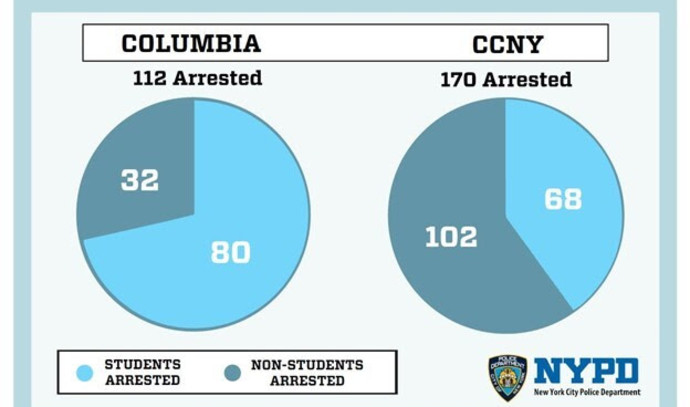
Over half of campus protesters arrested by NYPD unaffiliated with the schools
In the statement, Adams said it became "abundantly clear" that individuals unaffiliated with the schools had entered the campuses and, in some cases, trained students in unlawful protest tactics.
The cops are lying.View attachment 321570

Over half of campus protesters arrested by NYPD unaffiliated with the schools
In the statement, Adams said it became "abundantly clear" that individuals unaffiliated with the schools had entered the campuses and, in some cases, trained students in unlawful protest tactics.m.jpost.com
They are counting faculty as not being students and counting students from other universities as not being students.
Meanwhile Columbia has an intel office that reports back to Israel.










